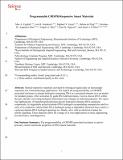Programmable CRISPR-responsive smart materials
Author(s)
English, Max A.; Soenksen Martinez, Luis Ruben; Gayet, Raphael V.; de Puig Guixe, Helena; Angenent-Mari, Nicolaas M.; Mao, Angelo S.; Nguyen, Peter Q.; Collins, James J.; ... Show more Show less
DownloadAccepted version (9.614Mb)
Open Access Policy
Open Access Policy
Creative Commons Attribution-Noncommercial-Share Alike
Terms of use
Metadata
Show full item recordAbstract
Stimuli-responsive materials activated by biological signals play an increasingly important role in biotechnology applications. We exploit the programmability of CRISPR-associated nucleases to actuate hydrogels containing DNA as a structural element or as an anchor for pendant groups. After activation by guide RNA–defined inputs, Cas12a cleaves DNA in the gels, thereby converting biological information into changes in material properties. We report four applications: (i) branched poly(ethylene glycol) hydrogels releasing DNA-anchored compounds, (ii) degradable polyacrylamide-DNA hydrogels encapsulating nanoparticles and live cells, (iii) conductive carbon-black–DNA hydrogels acting as degradable electrical fuses, and (iv) a polyacrylamide-DNA hydrogel operating as a fluidic valve with an electrical readout for remote signaling. These materials allow for a range of in vitro applications in tissue engineering, bioelectronics, and diagnostics.
Date issued
2019-08Department
Massachusetts Institute of Technology. Department of Biological Engineering; Massachusetts Institute of Technology. Institute for Medical Engineering & Science; Massachusetts Institute of Technology. Department of Mechanical Engineering; Massachusetts Institute of Technology. Synthetic Biology CenterJournal
Science
Publisher
American Association for the Advancement of Science (AAAS)
Citation
English, Max A. et al. " Programmable CRISPR-responsive smart materials." Science 365, 6455 (August 2019): 780-785 © 2017 The Authors
Version: Author's final manuscript
ISSN
0036-8075
1095-9203